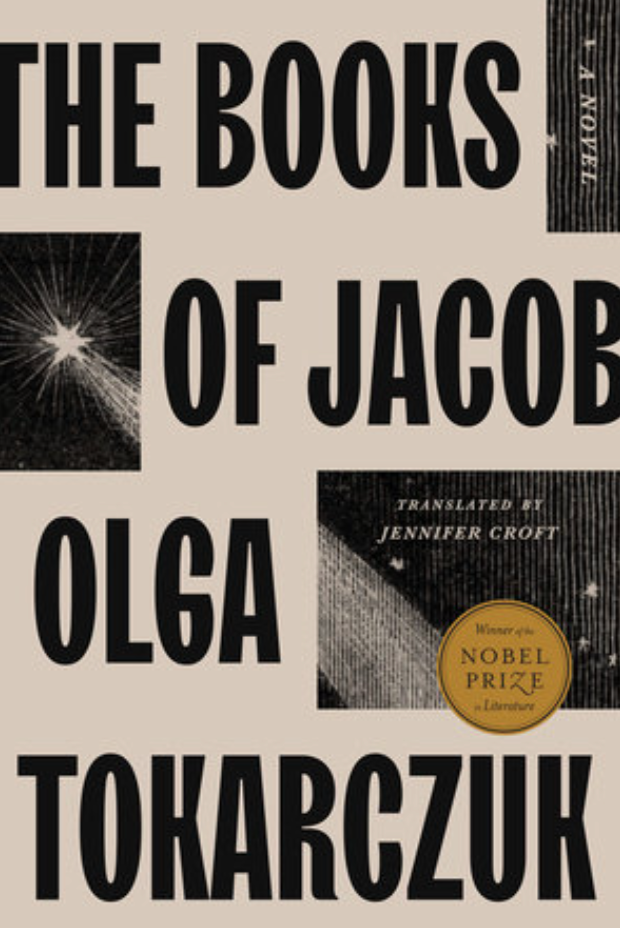Olga Tokarczuk’s twelfth book, the novel The Books of Jacob, first published in Poland in 2014 to great acclaim and considerable controversy, kicks off in 1752 in Rohatyn, in what is now western Ukraine, and winds up in a cave near Korolówka, now eastern Poland, where a family of local Jews has hidden from the Holocaust. Between mid-18th-century Rohatyn and mid-20th-century Korolówka, Olga traverses the Habsburg and Ottoman Empires and the Polish-Lithuanian Commonwealth in search of the manifold secrets of Jacob Frank, a highly charismatic real historical figure, beloved and despised by his contemporaries, the leader of a wildly heretical Jewish sect that converted in different moments to both Catholicism and Islam.
The novel is divided into seven books: The Book of Fog, The Book of Sand, The Book of the Road, The Book of the Comet, The Book of Metal and Sulfur, The Book of the Distant Country and The Book of Names.
It is the second book that most concerns us now. It opens as follows:
Bywa, że Bóg męczy się swoją światłością i ciszą, mdli go od nieskończoności. Wtedy, jak ogromna, wszechwrażliwa ostryga, której ciało, tak nagie i delikatne, czuje najmniejsze drganie cząsteczek światła, kurczy się w sobie i zostaje po nim trochę miejsca, gdzie od razu z zupełnie niczego pojawia się świat. Najpierw świat przypomina pleśń, jest delikatny i biały, ale rośnie szybko, pojedyncze nitki łączą się ze sobą, tworząc mocne poszycie. W końcu twardnieje i odtąd zaczyna nabierać kolorów. Towarzyszy temu niski, ledwie słyszalny dźwięk, ponura wibracja, która wprawia atomy w niespokojne drżenie. Z tego właśnie ruchu powstają cząsteczki, a potem ziarnka piasku i krople wody, które dzielą świat na pół.
Teraz jesteśmy po stronie piasku.
This section of the book—the novel doesn’t have chapters in a traditional sense—is titled “O tym, jak ze zmęczenia Boga powstaje świat,” which, taking a certain poetic license—a license it is imperative I take, lest I fall prey to Robert Frost’s 1959 definition of translation as “that which is lost out of both prose and verse”—means something along the lines of “Of how it was the world was born of God’s exhaustion.” A somewhat scandalous suggestion on the part of Olga’s narrator that only gets bolder as we continue to read.
“Bywa, że Bóg męczy się swoją światłością i ciszą, mdli go od nieskończoności,” that first paragraph starts. “It happens, that God tires of his brightness and quiet, he sickens of infinity.” That is as close to a literal, word-for-word translation as I can muster without breaking all the rules of English grammar. For now, I have left the original Polish punctuation, even though the Polish conventions surrounding punctuation differ significantly from the ones we have in English. The Google version of this opening is: “It happens that God is tired of his light and silence, fainting him from infinity.” My own first sentence: “Every now and then, God wearies of his own luminous silence, and infinity starts to make him a little bit sick.”
The words of the text are the embodiment of its past. Its sentences, on the other hand, lead the way into its future.
“Every” echoes the Polish “bywa,” meaning “it happens,” or “it so happens,” implying “sometimes”: the third-person singular present tense of the frequentative imperfective form of “to be.” In Polish, this first word lends a somewhat folksy feel to a first sentence that soon vaults into the metaphysical. God tires or is tiring—Polish does not have a present continuous tense like English or Spanish, so the translator must choose based on context clues—of his (own) light or brightness and quiet or silence. The word for quiet or silence is the usual word: “cisza.” The word for light or brightness, meanwhile, is the usual word for light—światło—plus an -ść ending that raises the register a bit. This word, literally “lightness,” often comes up in the context of religion, and more particularly, the Catholic faith that predominates in Poland. It is used, for instance, in the so-called Prayer for the Eternal Rest:
Eternal rest grant unto them,
O Lord, and let perpetual light
shine upon them. May the souls
of all the faithful departed, through
the mercy of God, rest in peace.
Where it says “perpetual light” in English (“lux perpetua” in Latin), in Polish it says “światłość.” Yet this “perpetual” is part of the word’s unfathomable background, and I also can’t use it in my translation because it is too close to what comes next: “mdli go od nieskończoności,” literally “sickens him from infinity.”
The words “światło”—“light”—and “światłość”—lightness or perpetual light—both contain the word “świat,” which is “world.” This will become very important in a moment.
“Every now and then, God wearies of his own luminous silence, and infinity starts to make him a little bit sick.” The trochaic meter of the opening clause is in keeping with the structure of Polish—in which the stress is always on the penultimate syllable of the word—and the particular rolling rhythm of Olga’s writing. The words “wearies” and “luminous” are relatively formal, elevated—as is shifting from noun to adjective, a not uncontroversial choice—while “starts to make him a little bit sick” is informal, in keeping with the deckle edge of Olga’s sentence, which is both humorous and profound.
One drawback to my version is that it weighs in at a whopping twenty-one words, versus the original’s modest thirteen. Because English does not have grammatical case, we need prepositions like “with”; because English can’t abide a run-on sentence, we need to add an “and”; to mark an infinitive, we require a “to.” Translations of Slavic languages into English are generally about thirty percent longer than their originals. But it’s mostly my decision to start with “every now and then” that tips the scales, and I will have to see if I can compensate for that with something pithier over the course of the next few lines.
So now we know from the section title—“Of how it was the world was born of God’s exhaustion”—and the first sentence of the main body of the text that our narrator has determined to rebel against any story of creation with which we might have been familiar, in order to suggest instead that God has weaknesses and failings—that God might even suffer from as humiliating a complaint as ordinary boredom. And as if that weren’t enough, she will now go on to suggest that the world, a world, presumably our world, is a product of that sad malady—that humanity is nothing more than a diversion, the result of some irritation and an almost animal reaction to the same.
Language can’t be separated from the people who create and connect with one another through it.
This is where the connection between the Polish words pertaining to “light” (“światło” and/or “światłość”) and “world” (“świat”) makes itself felt. While there is not a way to reproduce this resonance identically, I got lucky with English, which connects “world” with “word.” I have tried to take advantage of this stroke of luck throughout this vast and treasure-laden tome.
For the connection between light and this particular version of the creation of the world is in no way arbitrary. Olga’s provocative rendering is drawn from a much older provocation, first arising in Isaac Luria’s version of Kabbalah, the most influential and resistant strain of Jewish mysticism. Unlike earlier kabbalists, Luria treated creation not as a positive event, but as a negative one. Before creation, divine light filled every available space, meaning that in order to create the world, God had to endure the process of tzimtzum, a Hebrew word that attained special power in Lurianic Kabbalah, where it became a term for God’s self-diminishing, or shrinking, to make room.
“Without contraction, there is no creation, as everything is Godhead,” writes Gershom Scholem, the German-born scholar who revolutionized the study of Kabbalah. “Therefore, already in its earliest origins, the creation is a kind of exile, in that it involves God removing Himself from the center of His essence to His secret places.” Scholem (a close friend of Walter Benjamin, whom we will come to in a moment) will be a guiding light for Olga throughout The Books of Jacob, which is after all a chronicle of exile and the quest to undo that original absence and every removal that came after.
But let’s get back to the sentence in question for now. “Wtedy, jak ogromna, wszechwrażliwa ostryga, której ciało, tak nagie i delikatne, czuje najmniejsze drganie cząsteczek światła, kurczy się w sobie i zostaje po nim trochę miejsca, gdzie od razu z zupełnie niczego pojawia się świat.” “Then, like an enormous, all-sensing oyster, whose body, so naked and delicate, feels the smallest vibration of particles of light, contracts inside itself and there remains after it a little space, where right away out of absolutely nothing there appears a world.” The Google version: “Then, like a huge, all-sensitive oyster, whose body, so naked and delicate, feels the slightest twitching of light particles, it shrinks in itself and leaves a little space after it, where the world immediately appears from nothing.”
Slavic languages do not have articles, definite or indefinite. English requires them; ending this sentence with “there appears world” is not an option unless intelligibility is not something we care about. The translator must intuit, then, the definiteness or indefiniteness of a noun from its context; in this case, although we may already suspect that the world in question is our world—and thus a definite, specific world—what the preceding sentence tells us is that this happens “every now and then.” In which case, each time it happens, “a” new world is created, freshly nacred and luminous and bored.
Let us not forget the oyster. The Polish word for “oyster” is feminine, so every adjective that applies to it in the original describes a feminine being—no doubt not a coincidence in the work of a proudly feminist writer like Olga Tokarczuk. The oyster is first of all “ogromna,” which I always like to translate as “enormous,” due to the confluence of sounds between the two words. It is “wszechwrażliwa,” which is a highly unusual compound word made up of “wrażliwa,” sensitive, and the prefix “wszech,” which appears in slightly more common adjectives like “wszechmocna,” omnipotent, or “wszechwiedząca,” omniscient, suggesting “omni” as the appropriate divine prefix in the English translation: “omnisensitive.”
Preserving Polish word order in English necessarily makes for less fluid sentences, and it sometimes results in complete incomprehensibility.
Thus the oyster is enormous and omnisensitive. Now for its body. Its body, so naked and delicate, feels—or can detect—the slightest tremor in particles of light, scrunches up into itself, and—now the sentence switches subjects—there remains after it a little space, where at once from completely nothing appears a world. Or, perhaps, we maintain the same subject in the translation: it leaves a tiny space where a world immediately appears, out of nowhere. Where a world comes to be out of absolutely nothing. It leaves a tiny space for a world to arise or emerge or come about or be born.
What to do with this final clause?
The “theres” in “there remains after it a little space” and “there appears a world” are not there in the original; English requires we add something to help smooth out the different syntax. But these filler “theres” are clunky and don’t exactly suit the scene. “Appears a world” is as impossible in English as “there appears world”: not in fact impossible, but enough of a departure from what Anglophones expect that it must necessarily shift the reader’s focus from what to how: rather than experiencing Olga’s context, the reader will experience a disruption of the English language, which might distract her completely from the molluscoid god of Books of Jacob, propelling her into a consideration of how English works and why.
This consideration might well not be in vain, and we can return to such disruptions as indeed strategies for provoking larger reflections, but let us agree for now that my goal in this translation is instead to beautifully render Olga’s ideas. Part of an idea is how it’s ordered. And of all the questions that have come up in this paragraph so far, having to do with rhythm, register, and the balance of sanctity or profundity and humor, the trickiest one is this one.
Let’s think about syntax, why it’s hard to translate (why there are mixed opinions in translation studies about how to handle it), why it matters and possible ways to move forward.
The word “syntax” comes from the Ancient Greek “σύνταξις,” meaning “coordination”: “syn,” or “together,” and “táxis,” or “ordering.” Today, in English, it designates the “set of rules and principles in a language according to which words, phrases, and clauses are arranged to create well-formed sentences,” or “the ways in which a particular word or part of speech can be arranged with other words or parts of speech.” These are, respectively, the ethical and intersubjective aspects of the word.
For words are similar to selves in constitutive qualities and behavior and can be productively considered according to categories proposed for understanding the nature of selfhood in a range of philosophical works, among them Oneself as Another by Paul Ricoeur and Kathleen Blamey, Sources of the Self by Charles Taylor and After Virtue by Alasdair MacIntyre. Though very different from one another in style and purpose, all three of these texts wind up speaking of selves as comprised of three facets: the narrative, the intersubjective and the ethical.
A self is narrative because it must see itself in terms of a life story. It finds those terms in conceptual apparatuses such as language and time. It conceives of the former by way of the latter and expresses the latter by way of the former. Each self’s life story contains causes and effects, arising from a beginning and leading to an end.
Kate Briggs points out that “literary translation, as a labour of changing words, and changing the orders of words, is always and from the outset wrong.”
A self is intersubjective, or “transpersonal,” as Taylor says, because it cannot achieve its telos without the collaboration of other selves, whether these selves function as helpmeets or as obstacles to be overcome along the self’s “journey.” Nor can the self conceive of itself as such except in conjunction with and in contradistinction to its others.
Finally, a self is ethical because it grounds its sense of selfhood in judgments of value. Self-esteem depends on the degree to which the self lives well and for others in justice, as Riceour points out particularly. “To know who I am,” writes Taylor, “is a species of knowing where I stand.” Metaphorically, “where I stand” refers here to what I consider to be right and wrong with regard to my behavior and that of others, while also harking back to the historical positioning of the self in its society, in relation to other selves, and what its roles as a member of that society are.
For a word, narrative identity is etymology: the origins and evolution over time of the word. The ethical facet of a word is what values it holds, meaning what its definition is. This facet is the easiest to swap out from one language to the next, even when it requires several words to translate one. But while “wskazówka” may mean something like “clue” in Polish, and “pista” may (partly) mean something like “clue” in Spanish—that is, may hold similar semantic values—their histories and narrative identities, and thus their connotations, will be completely different.
A word’s intersubjective facet is how it behaves in a phrase and how it interacts with its neighbors. You can try to stop time, and you can try to prevent time from doing something (like advancing), and maybe these attempts will be equivalent, but how they play out in a sentence will differ enough to change the rhythm of the text.
For Riceour, ethics means “living well with and for others in just institutions.” MacIntyre, meanwhile, argues that modern selves are adrift, unlike pre-modern selves, who “inherit a particular space within an interlocking set of social relationships; lacking that space, they are nobody, or at best a stranger or an outcast. To know oneself as such a social person is however not to occupy a static and fixed position.”
Very few words function well on their own. The ones that do are mostly interjections and emphatic particles, like the German “doch,” or the Argentine “che.” The vast majority of words, however, must coexist in a manner that is productive (of meaning, for example) with other words, in institutions called grammatical sentences; in grammars that haven’t crumbled over time, the noun’s role is clear from its case, as we have discussed. Precisely because of this, the position of a Polish noun in a sentence is not fixed.
In Slavic languages, because the endings of nouns change depending on their purpose in a sentence, word order varies considerably more than it does in English, where we can only know what the subject of the sentence is, versus its object, by following the order in which they appear. “Jennifer Croft eats pizza” is a really different sentence in English than “Pizza eats Jennifer Croft” (although what a way to go!). But imagine if we did have a full case system in English, and the accusative case of a noun, which indicates a noun being acted upon, generated an ending of “#.” Then we could say “Pizza# eats Jennifer Croft,” or “Jennifer Croft eats pizza#,” and the only thing that would change would be what gets emphasized, and what we know when.
I come up for air or clamber out of the water, and holding onto the original is like striving to maintain all the moisture on my skin as the sun lifts it away from me drop by drop.
What we know when is extremely important to narrative; if we were told in the first sentence of Daphne du Maurier’s Rebecca what had really happened to Maxim de Winter’s wife, and how, and why, and what would become of Manderley, would we even keep reading? The reader has to live the process of apprehension, experience a world in an order, not all at once. The Polish phrase “gdzie od razu z zupełnie niczego pojawia się świat” is not the same as “gdzie świat pojawia się z zupełnie niczego od razu,” just as “Along Comes Mary” is not the same as “Mary Comes Along.” In the former, the emphasis is on the specialness of Mary, the unexpectedness of her, her out-of-nowhereness.
And the rhythm is different. Think of the anonymous children’s rhyme:
Itsy bitsy spiderClimbed up the waterspout;
Down came the rain
And washed the spider out;
Out came the sun
And dried up all the rain;
And the itsy bitsy spider
Climbed up the spout again.
“The rain came down” would have massively less effect than “down came the rain” does. “Down came the rain” starts with deluge; “out came the sun” offers an unanticipated twist. We might have been expecting something else after “out came”: the stain? The blame?
It’s microsuspense, and it happens so fast we might not even think we notice, but it affects our reading all the same. It accumulates over the course of the story; it is the tiny space left by an oyster-author for the emergence of a world.
Since if I say: “like an enormous, omnisensitive oyster, its body, so naked and delicate, feels the slightest tremble in the particles of light, scrunches up inside itself, leaving just enough space for a world to come completely out of nowhere, at once,” then the reader encounters world before nowhere and before at once—and in that case, why are nowhere and at once even there?
The principal quality of suspense is finitude; we are always aware of its imminent end, which permits us to cherish it. Microsuspense is even more precious due to the proximity of the full stop: soon we will know, and from that point forward, we will never unknow—a gain that feels more like a loss.
Recent writing on translation has emphasized the unique creative practices of individual translators. Whenever I translate, I first immerse myself in the original as though taking a dip in a lovely cove, far from the eyes of anyone, where the water’s always warm. (I hope it does not undermine all that I have said so far to confess that in life I am not a good swimmer, and that I have never gone swimming in a cove.) By immersing myself, I can feel weightless as the body of the work suspends me—my preoccupations, much of my subjectivity, which merely acts as a filter—and I can allow the images generated by the words of the original to wash over me, feel them all around me, form them afresh in my cleared head.
This sort of suspension is temporary, too. I come up for air or clamber out of the water, and holding onto the original is like striving to maintain all the moisture on my skin as the sun lifts it away from me drop by drop. Now the words of the original find their reflections on the surface of the ocean, as if my translations of them were inevitable, even though others would opt for other words. Now I rearrange the original’s sentences, letting them conform to the different conditions of the shore. I rearrange them with a mind to move on from here soon, with my next destination in my sights.
Kate Briggs points out that “literary translation, as a labour of changing words, and changing the orders of words, is always and from the outset wrong.” But she, like me, believes that that’s not what translation is.
In Slavic languages, because the endings of nouns change depending on their purpose in a sentence, word order varies considerably more than it does in English.
When it comes to verbal disposition and disordering, we might look back at an essay we have mentioned already. Although it arose out of his own translation practice, in the century since its original publication, Walter Benjamin’s “Task of the Translator” introduction has flummoxed and bewildered readers concerned with the practice of translation by carrying notions of poetry, magic and spirit even further to enter into the territory of the messianic, of a pure language likely to be reconstituted on the day of humanity’s salvation, a pure language we can only get a glimpse of now thanks to translation, which acts as afterlife to the original and in so doing keeps up the connections—which are mostly concealed by communication, or the desire to communicate—between the mortal languages of man.
Not that helpful when you’re trying to wrangle a paragraph of Polish into English.
Translator Chantal Wright notes: “In fact, Benjamin’s text feels calculated to produce this tension, marked as it is by syntactic and lexical idiosyncrasy, by re-definitions of terms and by slippery signifiers.”
On the other hand, maybe Benjamin is the only one who can help here, as we struggle to seize Olga’s slippery oyster god.
For Samuel Weber’s innovative book Benjamin’s -abilities posits as follows:
When Benjamin writes that the specifically poetical signification cannot be identified simply with what is meant, with the meaning of the phrase, but rather has to do with “how the meant is bound to the way of meaning in the determinate word,” he indicates both that the semantic dimension of meaning plays a role in binding the way of meaning to particular words, and that the configuration of such binding is not itself determined semantically. Rather, it is syntactical. For what is decisive is how an object or concept is bound to an individual word, and through it, to a particular way of being-meant. And this idea of being bound to or up with individual words depends on a spatial arrangement that can be designated both as syntactical and as singular.
What this boils down to is not exclusively mysterious. Benjamin calls for word-for-word translation, for keeping the syntax of the original intact in the translation, even at “the risk of madness,” as Weber rightly notes.
The Slavic languages order their words differently from the Germanic and the Romance languages. Preserving Polish word order in English necessarily makes for less fluid sentences, and it sometimes results in complete incomprehensibility. This predicament becomes more dire when the distance between languages is increased.
Chamini Abesiriwardhane Kulathunga translates from Sinhala into English. Sinhala is, like English, an Indo-European language, but it is a member of the Indo-Aryan branch of the family, at a significant historical from the European branch. Kulathunga translates the opening of Tennyson Perera’s 1967 Cogwheel Buddha, the first novel ever banned in Sri Lanka, as follows: “Somebody once said that the Maitree Buddha would be enlightened under the giant tamarind tree at the public library. That somebody was a drunk, and his statement has remained deep-seated in my mind.” Translated word for word, these two sentences (“මහජන පුස්තකාලයේ දැවැන්ත සියඹලා ගස යටදී මෛත්රී බුදු හාමුදුරුවෝ බුදු වනු ඇතැයි කිසිවකු කියනු මට ඇසී ඇත. බීගත් අයෙකු විසින් කරන ලද ඒ ප්රකාශය මගේ සිත තුල කිඳා බැස ගියාක් වැන්න.”) become: “Public library (in) huge tamarind (tree) under Maitree Buddha attain enlightenment that someone saying me heard. Drunken someone by made that statement my mind inside sunken deep like.”
Again, Sinhala is still related to English, albeit distantly. Many of the world’s languages bear no known relation to ours. What happens, then, in a translation that’s determined to preserve the syntax of a language such as Amdolese or Aymara, Japanese or Javanese, Wolof or Zuni?
For a word, narrative identity is etymology: the origins and evolution over time of the word. The ethical facet of a word is what values it holds, meaning what its definition is.
“But a relation to language in which syntax—the sequential arrangement of words—takes precedence over the time-and-space transcending rules of grammar and semantics; in which the ways of meaning, their distribution and relations, have priority over what is meant—this would be a language that seems to approach what Benjamin ‘means’ by ‘pure language,’” Weber suggests. If this is what we’re going to do, then Olga’s sentence in English reads as follows: “Then, like an enormous, omnisensitive oyster, whose body, so naked and delicate, feels the slightest tremble in the particles of light, scrunches up inside itself and remains after it a bit of space, where at once from completely nothing emerges world.”
This is probably largely intelligible, but I would argue that the way of meaning here’s completely wrong. What has been removed are the people: Olga and myself. All that’s left is bare language—yet language is a human innovation, the thing that humans made that made us human.
The sentence “Drunken someone by made that statement my mind inside sunken deep like,” on the other hand, tells us almost nothing about what’s going on, or what’s about to happen, within the novel Cogwheel Buddha. If it does make inroads into the pure language that awaits us when all individual languages finally fall away—which may as well be some future version of AI, an evolved-to-be-functional Google Translate—it nonetheless so obscures the “semantic dimension of meaning” that it would be hard for us to glimpse such possibility. It also razes all of the more elusive elements of literary works, such as atmosphere and tone.
With a couple of careful modifications, a syntactically disruptive translation might make visible the structure of a daily language readers take for granted, might make people aware of convention in such a way as to even enhance the power of individual words stripped of obvious connections, as if spotlit—but such careful modification would be directed by human intention, and Benjamin’s appeal to the translator is that she not have any goal in mind.
Language can’t be separated from the people who create and connect with one another through it. I don’t share Benjamin’s faith in a pure language to come. But I do think he’s right that it is syntax that ushers the original work into its “afterlife,” as he calls it.
The words of the text are the embodiment of its past. Its sentences, on the other hand, lead the way into its future, and in so doing, they also pass through the vast, dynamic labyrinth of the translator’s imagination.
Chantal Wright roundly ignores Benjamin’s “call for syntactic fusion.” Susan Bernofsky, the wonderful translator of German literature into English, writes this about her process of revision in translation:
Sometimes the best translation is one whose syntactical structure bears little resemblance to that of the original. At the same time, it is important to be conscious of the order in which information arrives. Every sentence is a journey that begins with a particular phrase or image and takes the reader somewhere. So what does the itinerary of a particular sentence look like, and where does it lead?
This strikes me as an extraordinarily helpful modification to Benjamin’s suggestion: try, when possible, to keep the original end—the destination the author appointed as the sentence-journey’s goal.
In which case, here’s my version of the whole opening of Book II of The Books of Jacob, The Book of Sand:
Every now and then, God wearies of his own luminous silence, and infinity starts to make him a little bit sick. Then, like an enormous, omnisensitive oyster, its body—so naked and delicate—feels the slightest tremble in the particles of light, scrunches up inside itself, leaving just enough space for the emergence—at once and out of nowhere—of a world. The world comes quick, though at first it resembles mold, delicate and pale, but soon it grows, and individual fibres connect, creating a powerful surrounding tissue. Then it hardens; then it starts to take on colours. This is accompanied by a low, barely audible sound, a gloomy vibration that makes the anxious atoms quake. And it is from this motion that particles come into being, and then grains of sand and drops of water, which divide the world in two.
We find ourselves now on the side of sand.
To the extent that the map can change the territory by determining an undetermined space or feature, by designating its use or at least suggesting it by name, I have likely both narrowed and expanded Olga’s original text in my translation here. I did not succeed in cutting down the size of any of the other sentences of this opening paragraph, though I’m not convinced of the necessity of such perfect matching. What I hope to have generated is microsuspense: the desire to keep reading, the drive to turn the page.
__________________________________

The Books of Jacob by Olga Tokarczuk (translated by Jennifer Croft) is available now from Riverhead.
Adblock test (Why?)








